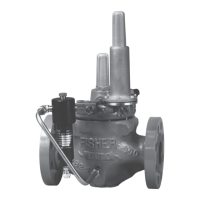the diaphragm assembly (key 7). If used, make sure
the diaphragm limiter is installed beveled side up on
Types 161EB and 161EBM pilots with 200 to
350 psig / 13.8 to 24.1 bar outlet pressure range.
Lightly apply lubricant to the control spring seat.
7. Install the spring case (key 2) on the body (key 1)
with the vent (key 18) properly oriented. Make sure
the vent is not directly over inlet or outlet piping due
to possible icing. Install the machine screws (key 13,
not shown), using a crisscross pattern, torque
them to 5 to 7 ft-lbs / 6.8 to 9.5 N•m for stainless
steel bodies and 2 to 3 ft-lbs / 2.7 to 4.1 N•m
for aluminum bodies. Lubricate the adjusting
screw threads.
8. When maintenance is complete, refer to the Startup
and Adjustment section to put the regulator back
into operation and adjust the pressure setting.
Tighten the locknut (key 12), replace the closing cap
gasket (key 17) if necessary and install the closing
cap (key 16).
161AY Series Pilots (Figure 20)
Body Area
Use this procedure to gain access to the disk
assembly, orice and body O-ring. All pressure must
be released from the diaphragm casing and the disk
assembly must be open, before these steps can
be performed.
1. Remove the cap screws (key 2) and separate the
diaphragm casing (key 4) from the body (key 1).
2. Remove body seal O-ring (key 11) and the back-up
ring (key 50). Inspect the body seal O-ring and replace
if necessary.
3. Inspect and replace the orice (key 5) if necessary.
Lubricate the threads of the replacement orice
with a good grade of light grease and install with
29 to 37 ft-lbs / 39 to 50 N•m of torque.
4. Remove the cotter pin (key 15) if it is necessary to
replace the disk assembly (key 13) or the throat
seal O-ring (key 31) of a Type 161AYM.
5. For a Type 161AYM, inspect the throat seal O-ring
(key 31) and remove the machine screw (key 33).
Replace O-ring if necessary.
6. Install the disk assembly (key 13) and secure it
with the cotter pin (key 15).
7. Place back-up ring (key 50) into the body (key 1)
then place the body seal O-ring (key 11) into the body.
8. Place the diaphragm casing (key 4) on the body
(key 1). Secure the diaphragm casing to the body
with the cap screws (key 2).
Diaphragm and Spring Case Area
Use this procedure to change the control spring and to
inspect, clean or replace parts in the spring case and
diaphragm assembly.
To Change the Control Spring:
1. Remove the closing cap (key 22) and turn the
adjusting screw (key 35) counterclockwise until all
compression is removed from the control spring
(key 6).
2. Change the control spring (key 6) to match the
desired spring range.
3. Replace the adjusting screw (key 35).
4. Install the replacement closing cap gasket (key 25)
if necessary and reinstall the closing cap (key 22).
5. If the spring was changed, be sure to change the
stamped spring range on the nameplate.
To Disassemble and Reassemble Diaphragm Parts
1. Remove the closing cap (key 22) and turn adjusting
screw (key 35) counterclockwise to remove adjusting
screw, bafe plate (key 56) and control spring (key 6).
2. Remove the spring case hex nuts (key 23, not
shown), cap screws (key 24) and spring case (key 3).
3. Remove the diaphragm (key 10) and attached parts
by tilting them so that the pusher post (key 8) slips
off the lever assembly (key 16). To separate the
diaphragm (key 10) from the attached parts, unscrew
the machine screw (key 38) from the pusher post
(key 8).
4. Inspect the pusher post (key 8) and the body seal
O-ring (key 11), replace if required.
5. Remove hex nut (key 21) to separate the
diaphragm (key 10) and attached parts.
6. To replace the lever assembly (key 16), remove
the machine screws (key 17). To replace the
stem (key 14) or access the stem seal O-ring
(key 30) also perform Body Area Maintenance
Figure 12. Expanded View of the Body Area
Showing the O-ring and Back-up Ring Placement
BODY SEAL O-RING (KEY 11)
BACK-UP RING (KEY 50)
BODY (KEY 1)
21
Type EZR

